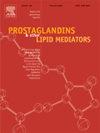The effect of highly bioavailable forms of curcumin on lipoprotein(a) plasma levels: A systematic review and meta-analysis of randomized clinical studies
IF 2.5
3区 生物学
Q3 BIOCHEMISTRY & MOLECULAR BIOLOGY
Prostaglandins & other lipid mediators
Pub Date : 2025-04-17
DOI:10.1016/j.prostaglandins.2025.106994
引用次数: 0
Abstract
Curcumin is a bioactive compound derived from the rhizome of Curcuma longa (turmeric) that has garnered increasing attention for its potential health benefits. However, its use in clinical practice is limited due to its generally poor bioavailability. This issue can be overcome using novel delivery systems that enhance curcumin’s solubility, extend its residence time in plasma, improve its pharmacokinetic profile, and increase its cellular uptake. Novel curcumin formulations with improved bioavailability have been suggested to elevate plasma concentrations of lipoprotein(a) (Lp(a)), but there is no definitive evidence of a causal relationship. To address this, a systematic literature search was conducted in multiple electronic databases to identify relevant randomized placebo-controlled clinical studies published without a time limit. A meta-analysis of data suggested that dietary supplementation with highly bioavailable forms of curcumin significantly reduces Lp(a) levels [Standardized Mean Difference (SMD)= -0.96 (95 % Confidence Interval (CI): −1.82, −0.11)]. The effect size was robust in the leave-one-out sensitivity analysis and was not primarily driven by any single study. Of course, the clinical significance of this observation should be more thoroughly evaluated in longer-term trials, where the combined metabolic and anti-inflammatory effects of curcumin have vascular protective effects.
高生物利用度形式的姜黄素对脂蛋白(a)血浆水平的影响:随机临床研究的系统回顾和荟萃分析
姜黄素是从姜黄(Curcuma longa)根茎中提取的一种生物活性化合物,因其潜在的健康益处而受到越来越多的关注。然而,由于姜黄素的生物利用率普遍较低,其在临床实践中的应用受到了限制。使用新型给药系统可以提高姜黄素的溶解度,延长其在血浆中的停留时间,改善其药代动力学特征,并增加其细胞摄取量,从而克服这一问题。有人认为,生物利用度提高的新型姜黄素制剂会提高血浆中脂蛋白(a)(Lp(a))的浓度,但目前还没有确切的证据表明两者之间存在因果关系。为此,我们在多个电子数据库中进行了系统性文献检索,以确定已发表的无时间限制的相关随机安慰剂对照临床研究。一项数据荟萃分析表明,膳食中补充高生物利用率姜黄素可显著降低脂蛋白(a)水平[标准化平均差(SMD)= -0.96 (95 % 置信区间(CI):-1.82, -0.11)]:-1.82, -0.11)].在剔除一项的敏感性分析中,该效应大小是稳健的,并非主要由任何一项研究驱动。当然,这一观察结果的临床意义应在长期试验中进行更全面的评估,因为姜黄素的代谢和抗炎综合效应具有保护血管的作用。
本文章由计算机程序翻译,如有差异,请以英文原文为准。
求助全文
约1分钟内获得全文
求助全文
来源期刊

Prostaglandins & other lipid mediators
生物-生化与分子生物学
CiteScore
5.80
自引率
3.40%
发文量
49
审稿时长
2 months
期刊介绍:
Prostaglandins & Other Lipid Mediators is the original and foremost journal dealing with prostaglandins and related lipid mediator substances. It includes basic and clinical studies related to the pharmacology, physiology, pathology and biochemistry of lipid mediators.
Prostaglandins & Other Lipid Mediators invites reports of original research, mini-reviews, reviews, and methods articles in the basic and clinical aspects of all areas of lipid mediator research: cell biology, developmental biology, genetics, molecular biology, chemistry, biochemistry, physiology, pharmacology, endocrinology, biology, the medical sciences, and epidemiology.
Prostaglandins & Other Lipid Mediators also accepts proposals for special issue topics. The Editors will make every effort to advise authors of the decision on the submitted manuscript within 3-4 weeks of receipt.
 求助内容:
求助内容: 应助结果提醒方式:
应助结果提醒方式:


